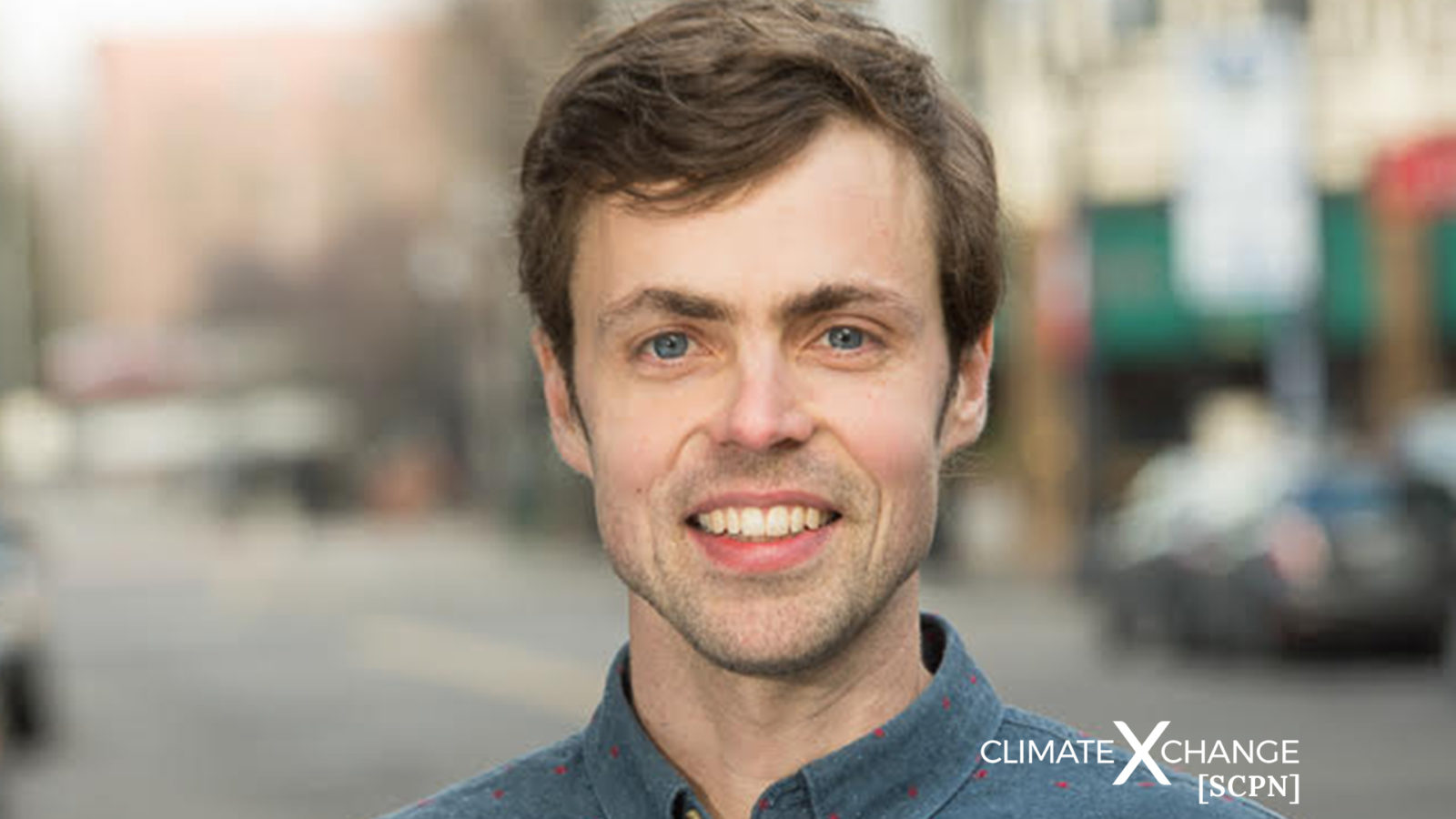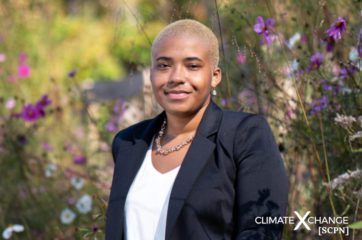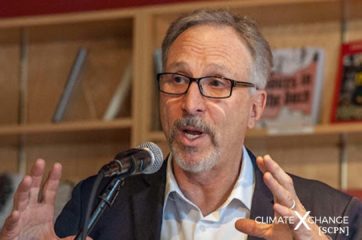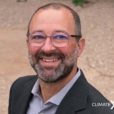All across the country, members of our State Climate Policy Network (SCPN) are fighting to make an impact on climate change in their communities. We have individuals in our Network from all 50 states, each experiencing climate change differently in their local areas and finding unique solutions to build resiliency efforts.
Joe Wachunas works on electrifying transportation for a nonprofit called Forth, based in Portland, OR. He focuses on many transportation-related issues at Forth, but currently works to bring the advantages of electrification to rural communities by providing electric agricultural equipment in Oregon.
This interview has been edited for brevity and clarity.
Zac Pinard
Could you tell me about yourself and the path you took to get to Forth?
Joe Wachunas
I’ve been almost a lifelong environmentalist. Going way back, I made my first compost pile in the fifth grade as part of an Earth Day celebration, so it was really near and dear to my heart. When my wife and I bought our home, we started making it as sustainable as possible. We electrified our appliances, we put solar panels on the roof, we made our house really efficient over a lot of years, and so for me sustainability was always a side passion, and something I did with my own house.
I think a lot of us have wake up moments. Mine was in 2017 during the terrible fires of that summer, where smoke came into the city for days on end in Portland, OR. It was a wake up moment that climate change was no longer something cute that I was doing for my grandkids, but something that was part of my making my life and community livable. It was here and now, so I felt the need to make sustainability a central focus of my work. At the time I was teaching Italian and working on real estate projects, and I completely changed careers by volunteering at a solar energy nonprofit in Portland. One thing led to another, and Forth had openings, and I was hired in January 2019. It was a complete career switch, but it absolutely feels aligned with what I want to be doing. Forth focuses on transportation electrification, and transportation is the number one source of carbon emissions both in Oregon and nationally, so it just feels like really crucial work to be doing to electrify our transportation.
Zac Pinard
That’s really cool. You had a sort of ‘come to Jesus moment’ when you see all the bad fires, but the way you describe it, it sounds like it was almost kind of easy, but I’m sure it wasn’t. Once you made that decision, did things just keep adding up, or did you have to go search for a while in different places to find a whole new start?
Joe Wachunas
Career switching is never easy. Between 2017 and 2019, when I started at Forth, I initially tried to form my own group of interested homeowners working on climate change; I set up a meetup group, and just a handful of people were coming. I started hosting events, but without an organization it is difficult to connect with people. I did a hot water heater tour of different water heaters and only ten people came. Then I decided to volunteer at a nonprofit, Solar Oregon. It was an all volunteer board and no staff, so I started volunteering, and then joined the board. An organization with an all volunteer board is really excited to have any volunteers who are really enthusiastic and active, so that seemed like a really great synergy and outlet for this kind of internal urge I was having to do more. The organization was generous enough to let me organize events and they had a large listserv that just got the ball rolling. I would recommend volunteering for a while and get the lay of the land, if you’re able to, and that seemed to allow entrance into the field for me.
Zac Pinard
With Forth specifically, what kinds of projects are you working on?
Joe Wachunas
Forth is a great organization. It started in 2011 with one staff member, and now we’re about 30. It’s grown a lot in ten years, just like electric transportation has. There’s a lot of room for growth, a lot of room for experimenting, and finding your niche. Forth really values finding the right place for its employees. I started off on the consumer engagement team, doing what we call ‘ride and drive events,’ where we bring EVs out to different communities and get butts in seats as we say, because 70% of Americans still haven’t driven an electric vehicle so we think it’s essential to try them out.
Zac Pinard
What if I’m, hypothetically, someone who has ridden in an electric vehicle but the owner didn’t let me drive it?
Joe Wachunas
Oh yeah there you go, you should come to one of our ride and drive events. I didn’t get mine until 2017. The majority of Americans still have not tried one yet, and there is a lot of engagement left to do. Forth has a whole team that does that. There is such a large ecosystem of electric transportation from electric bikes to electric trucks. I was really interested in electric scooters and bikes, so I started organizing working groups and then started writing grants. I realized last year in 2020 that I had a knack for writing grants, well at least up until now.
Zac Pinard
That sounds like a good knack to have!
Joe Wachunas
Yeah, especially in my neck of the woods. I helped write and win a couple grants, and both myself and the organization realized maybe I should be doing more development work, so I moved over to the project development team. My role at Forth now is to really put together projects and teams and write grants. It’s really such a blast, because there’s so much exciting stuff going on — electric tractors to electric school buses to electric car share, and all day long I just get to talk to fascinating people from great organizations.
Zac Pinard
I’m glad you brought up electric tractors, because I wanted to touch more broadly on the urban-rural divide here in the United States. Do you think there’s a way that the electrification of not just tractors, but the kinds of transportation and equipment that more rural Americans use and fewer urban Americans use, do you think that technology can help bridge that divide?
Joe Wachunas
Yeah absolutely, that’s one of the primary hopes in this program. That’s why it’s a really popular idea right now. By electrifying both tractors and other agricultural equipment, the hope is to bridge the divide and bring electric transportation and technologies to communities who have not received those benefits yet. A lot of urban centers now can see a lot of EVs and charging stations and experience the benefits of almost zero maintenance and one third the fuel costs. Bringing these benefits to rural communities is just front and center on a lot of people’s minds. Tractors just seem like an ideal way to do that, or at least to start there. Tractors, like any diesel machine, will have diesel pollution and particulate matter. They idle a lot, they’re super noisy, and of course you have the maintenance problems of any internal combustion machine, so electric tractors are superior in all those ways. Most people still haven’t heard of them because the industry is still in its infancy.
Zac Pinard
Is there any initial skepticism that you have to work through being from an organization centered in Portland where electrification has been, not necessarily a totally urban issue, but I’ve heard people in rural areas describe it that way?
Joe Wachunas
Absolutely, and that’s why we’re so lucky to be on an incredible team with three other nonprofits. Two of which are centered around working in rural communities — Sustainable Northwest and WY’East RC&D. Both of those organizations live and breathe work with rural communities and have the trust and experience. Forth is just one member of a team that’s trying to bring electric agriculture. We’re the transportation experts, but we rely on other orgs who have amazing connections in rural communities to really have that sense of trust and enable us to work with producers in communities to get these technologies out there.
Zac Pinard
I want to get back to something more about you now. There’s this debate in the sustainability community around focus on individual action vs. collective action, but some people would say the carbon footprint that matters is the carbon footprint of the major emitters like the whole transportation sector, which you mentioned. But you kind of started this work as part of your career after doing the things individually, so I was wondering what your take is on individual vs. collective action on a big environmental issue like climate change?
Joe Wachunas
My two cents are that with something as large as climate change, it’s never either or, it’s always both and. There’s just no way to solve this enormous problem, stopping the emission of 51 billion tons of CO2 a year, without the immense contribution of individuals, or communities, governments, corporations, you know we just need everybody at the table. As an individual before having any connections with an organization, I felt quite empowered that I could change a lot of things just in my own life. I think a lot of people feel powerless and hopeless, you know with some of these big intractable problems, but I find it quite hopeful that a majority of carbon emissions from our households, 60%, we have direct control over. These are just the energy systems we are using. Everything from our transportation, which is a huge share, to how we power our homes, our furnaces and water heaters, and this is energy that we’re buying. We can change that. Instead of funding the problem, we can fund the solution, and to me, that’s really empowering.
I’ll say by changing my individual actions, it has helped me become a better team player for an organization, and it’s given me a better sense of what needs to happen on the whole. One fun example, just in my family trying to do sustainable practices ourselves and experimenting with different ways to do it has really spilled over into my work. I spent a year as an exchange student in Italy, and I really learned the art of hang-drying laundry. Italians are amazing. Only 3% of Italians have a dryer in their home and this is the 8th largest economy in the world, and this is really true around the world. Most developed countries don’t use the dryer like Americans and Canadians do. So I’ve been fascinated by that. I’ve always hung-dried my laundry — I have it drying right over there. It has always been this passion for me.
When I was volunteering for Solar Oregon, I organized a ‘Hang Dry for Climate Change’ week where we try to encourage people to hang dry their laundry. This small act of hang-drying your laundry really struck a nerve. We got the local news in Portland and the local PBS station, and they came out asking, ‘what is this hang drying laundry?’ It just got out there. I wrote a couple articles about it too for CleanTechnica. It’s just this simple act of hang drying laundry that I learned in Italy and that my family has been doing now for years. I was interviewed by the New York Times and it came out last week on “How to Hang Dry Your Laundry.” With these individual practices and the work you’re able to do to solve this immense problem are really synergistic and really powerful — so I think we need a ‘both and’ is the short answer.
Zac Pinard
I went to Europe once and noticed people hang-drying their laundry. Do you think Americans don’t stop to consider their options as much?
Joe Wachunas
So much of it is a combination of cultural practices and technology, and hang drying laundry is more of a question of culture and practices. In other parts of the world, it’s not that everyone’s environmentally conscious — it’s cultural. In the United States, every environmentalist I know uses the dryer, so I think it is a lack of awareness and lack of seeing your neighbors and friends do it. It would be fun to try to change that. All of our grandparents did it and many of our parents used to hang dry our laundry, so we have that institutional knowledge. I think it would be great to bring it back.
Zac Pinard
That’s a nice example there of individual action leading to something bigger. I’ll bet you didn’t start hang-drying your laundry with the intention of getting interviewed by the New York Times.
Joe Wachunas
No exactly, but there it is! You never know what will resonate!
Zac Pinard
I’ll get back to this last part here about Forth more specifically. It’s centered in the Pacific Northwest (PNW), but does this type of work go beyond the PNW and how does it look beyond the PNW?
Joe Wachunas
Absolutely it does. In 2018, Forth won a grant as part of the American Climate Cities Challenge — which was funded by Bloomberg — to work with 25 cities across the U.S. to help them with their transportation electrification. We’ve been working with them, and that really helped us expand beyond our base in the PNW and work in fantastic cities and do lots of work from helping cities plan for charging infrastructure to helping them with their consumer engagement around EVs, and that’s led to further partnerships. For example, we’re working in North St. Louis with a senior center creating a project with electric transportation for seniors. Those partnerships have led to many other partnerships. We work definitely nationally now even though our home is for sure the PNW.
Zac Pinard
That’s good to know. I grew up around California and then moved up to the PNW, and sometimes I don’t remember that the rest of the country may or may not be doing this.
Joe Wachunas
I know, the left coast.
Zac Pinard
Does Forth have perhaps anything exciting coming up in June?
Joe Wachunas
We do! In addition to consumer engagement, we do demonstration projects where we try out electric technologies with communities, and then write about and publish them. Then we have a policy team that writes rebates and does a lot of work advocating for electric vehicles. We wrote the EV rebate in Oregon. One thing we really specialize in is that we’re this nexus — we call it the UN of Electric Transportation. We try to bring together all sorts of players from the ecosystem of transportation electrification, so that means charging companies, automakers, utilities, local governments, private individuals, and we create this big tent for folks.
One of the prime ways we do that is with this annual Roadmap Conference, which we have been doing for 14 years, and it’s one of the oldest and the largest conferences around transportation electrification in the U.S. This June, it’ll be virtual, but usually it’s in person in Portland and attracts thousands of folks and brings together so many great individuals and players around transportation electrification. That’ll be June 14–16th. It’s online so it’s more inexpensive this year and accessible, so it’s gonna be fantastic. We have great panelists, some of the top people in the industry making moves in transportation electrification. Thanks for giving us the opportunity to plug that!
Zac Pinard
The last question is a very important question and it’s putting you on the spot, but I think you can handle it. How do you say ‘thank you for this interview’ in Italian?
Joe Wachunas
Of course! Grazie mille per questa intervista.
Zac Pinard
Ok I’m gonna try it. Grazie mille per questa intervista
Joe Wachunas
Good job!
Zac Pinard
Thank you! And thanks so much, Joe, I really appreciate the interview.
Joe Wachunas
Thanks for taking the time. Usually we’re the ones interviewing folks, so it was interesting to be on the other end!









